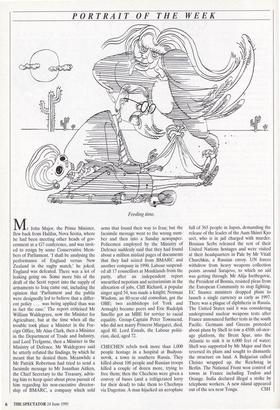PORTRAIT OF THE WEEK
Feeding time.
Mr John Major, the Prime Minister, flew back from Halifax, Nova Scotia, where he had been meeting other heads of gov- ernment at a G7 conference, and was invit- ed to resign by some Conservative Mem- bers of Parliament. 'I shall be analysing the performance of England versus New Zealand in the rugby match,' he joked; England was defeated. There was a lot of leaking going on. Some more bits of the draft of the Scott report into the supply of armaments to Iraq came out, including the opinion that 'Parliament and the public were designedly led to believe that a differ- ent policy . . . was being applied than was in fact the case.' The report criticised Mr William Waldegrave, now the Minister for Agriculture, but at the time when all the trouble took place a Minister in the For- eign Office, Mr Alan Clark, then a Minister in the Department of Trade and Industry, and Lord Trefgarne, then a Minister in the Ministry of Defence. Mr Waldegrave said he utterly refuted the findings, by which he meant that he denied them. Meanwhile a Mr Patrick Robertson had tried to send a facsimile message to Mr Jonathan Aitken, the Chief Secretary to the Treasury, advis- ing him to keep quiet about press pursuit of him regarding his non-executive director- ship of BMARC, a company which sold arms that found their way to Iran; but the facsimile message went to the wrong num- ber and then into a Sunday newspaper. Policemen employed by the Ministry of Defence suddenly said that they had found about a million mislaid pages of documents that they had seized from BMARC and another company in 1990. Labour suspend- ed all 17 councillors at Monklands from the party, after an independent report unearthed nepotism and sectarianism in the allocation of jobs. Cliff Richard, a popular singer aged 54, was made a knight; Norman Wisdom, an 80-year-old comedian, got the OBE; two archbishops (of York and Armagh) became peers and Eric Rudolph Smellie got an MBE for service to racial equality. Group-Captain Peter Townsend, who did not marry Princess Margaret, died, aged 80. Lord Ennals, the Labour politi- cian, died, aged 72.
CHECHEN rebels took more than 1,000 people hostage in a hospital at Budyon- novsk, a town in southern Russia. They killed about 100 people and Russian troops killed a couple of dozen more, trying to free them; then the Chechens were given a convoy of buses (and a refrigerated lorry for their dead) to take them to Chechnya via Dagestan. A man hijacked an aeroplane full of 365 people in Japan, demanding the release of the leader of the Aum Shinri Kyo sect, who is in jail charged with murder. Bosnian Serbs released the rest of their United Nations hostages and were visited at their headquarters in Pale by Mr Vitali Churchkin, a Russian envoy. UN forces withdrew from heavy weapons collection points around Sarajevo, to which no aid was getting through. Mr Alija Izetbegovic, the President of Bosnia, resisted pleas from the European Community to stop fighting. EC finance ministers dropped plans to launch a single currency as early as 1997. There was a plague of diphtheria in Russia. The United States said it was considering underground nuclear weapons tests after France announced further tests in the south Pacific. Germans and Greens protested about plans by Shell to tow a 450ft oil-stor- age platform, the Brent Spar, into the Atlantic to sink it in 6,000 feet of water; Shell was supported by Mr Major and then reversed its plans and sought to dismantle the structure on land. A Bulgarian called Christo wrapped up the Reichstag in Berlin. The National Front won control of towns in France including Toulon and Orange. India declared illegal a strike by telephone workers. A new island appeared out of the sea near Tonga. CSH


























































 Previous page
Previous page